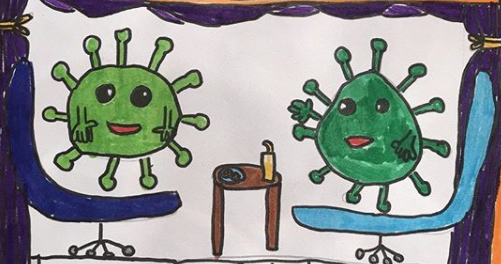
Findings and resources for talking to children about COVID-19
There is a problematic lack of age-appropriate educational resources to help children process the pandemic crisis, according to researchers from the Science Museum of Minnesota, who are sharing initial findings and resources from the first stage of a National Science Foundation-funded RAPID Research project studying COVID-19 education for children.
The project, which is being led by Science Museum of Minnesota researchers in partnership with American Public Media’s award-winning Brains On! children’s science podcast, explores children’s understanding of scientific concepts related to the pandemic and how informal education can provide science-based information to help ease children’s worries and support COVID-19-related family conversations.
What did we learn?
“Our first stage of findings reveal important insights into the kinds of questions children ages 5 to 12 are asking about the pandemic, the worries they have, and the types of support caregivers are seeking to be able to engage in discussions with their children about the COVID-19 pandemic specifically, and the science behind viruses and preventative health measures more broadly,” said Dr. Amy Grack Nelson, Evaluation & Research Manager at the Science Museum of Minnesota. “We hope these findings can inform the development of coronavirus-related educational resources responsive to the information and education needs of families as well as provide other researchers with insights that they can build on in their own work.”
Below are some key findings from the research:
More than two-thirds (68%) of children in the study expressed worries or fears about the coronavirus.
Almost all caregivers in the study (97%) said their child had asked them a question about the coronavirus.
The most frequently submitted questions to Brains On! between February and early June 2020 were related to preventative measures and uncertainty around the length of the pandemic.
More caregivers are relying on pandemic resources meant for adults or a general audience (65%), rather than resources developed specifically for children. This lack of child-focused resources to support pandemic-related information needs has left caregivers in the position of filtering and translating complicated and changing pandemic information to their children.
Caregivers need more support, information
Researchers also found caregivers would like support and guidance on how to talk to their children about a wide variety of pandemic-related topics, including these three topic areas:
Discussing and navigating risk. As a “new normal” of living during a pandemic sets in, caregivers want help discussing and navigating the risks related to safely re-entering society and interacting with people outside their households. The data show that caregivers are clearly struggling with understanding and evaluating the risks associated with participating in various activities. They are looking for guidance about how their children can socialize safely and navigate the risks involved. Caregivers also need support explaining the reasoning behind the relative risks to their children, why preventative measures are important, and how their children can employ them to interact safely with others.
Dealing with an uncertain future. Researchers heard concerns from children and their caregivers that leaders and public health experts cannot say how long preventative measures will be in place or how long it will be before key activities, like school or socializing with friends and family, will be back to “normal” again, if ever. Some children even expressed a worry that life may never go back to “normal.” Underlying much of the uncertainty are questions about vaccine development and when a vaccine will be available, seen by many as key to returning to a normal routine.
Understanding the nature of science. During the pandemic, the public is seeing the scientific process in action in a way they may never have before, including the testing of theories, the gaining of new insights, and the missteps that can happen along the way. Public health guidelines change as scientists learn more about the virus, and sometimes new information contradicts what scientists previously thought they knew. The revision of guidelines can cause people to feel like they don’t know what to believe or what guidance to follow. The changing nature of scientific insights is a topic caregivers would like help discussing with their child.

Learn more about the research
Read the full report or shorter executive summary to learn more about the results of the first phase of this research. The project goes through April of 2021in; findings will continue to be shared on the museum website so look for more posts about this research in the future.
Family-focused COVID-19 resources available
Museum researchers compiled a resource guide with tips on how to talk about pandemic-related topics with children, including how to include children’s perspectives in the conversation, challenge misleading or hurtful information, and draw from cultural contexts.
Brains On! has a series of coronavirus-related episodes informed by the research and will continue to develop more in the coming months.
Participate in the study!
Families are encouraged to check out the Brains On! episodes and then sign up to participate in this important study. The next survey will be sent to families in January 2021.